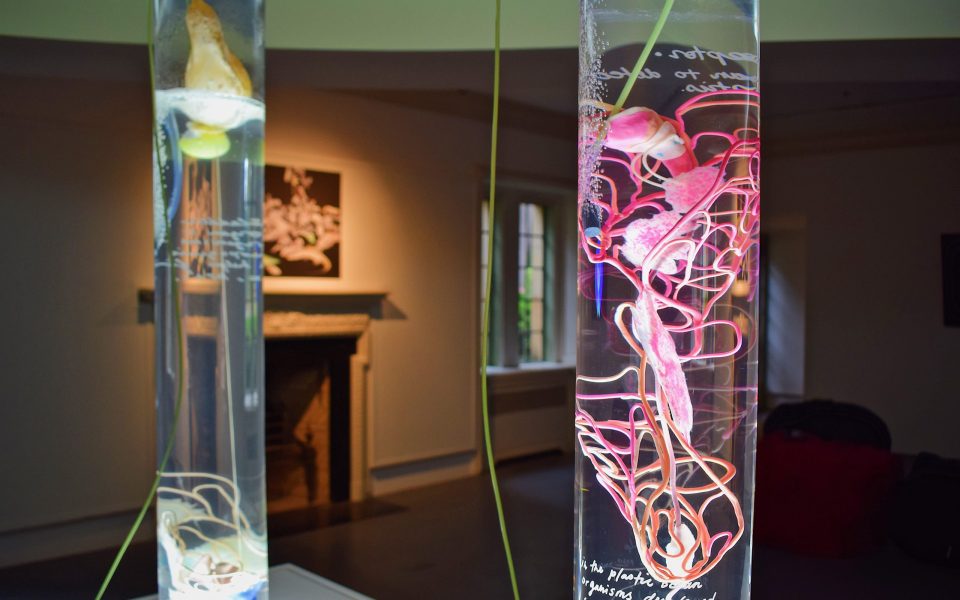A mesmerizing blue-and-lilac kitten operating with artificial intelligence doesn’t typically greet visitors via a large flat-screen TV in the entrance of SECCA’s Preview Gallery, but Pinar Yoldas’ futurist exhibit provides just that experience.
The Winston-Salem art museum currently hosts Yoldas’ work, which investigates the intersection of digital and natural ecological landscapes, as the newest installation of the 12-by-12 artist salon series through Nov. 19, featuring pop-up exhibitions and salon-style conversations with 12 artists from the 12th state (North Carolina) over two years.
Frankly, there’s not much to see — four pieces of multi-media artwork in all — but within the tiny space Yoldas delivers more than enough to ruminate on, perhaps while sitting on the giant red or navy cushion seats in the middle of the room that face the aforementioned kitten.
“The Kitty AI: Artificial Intelligence for Governance” imagines a world in which beings with artificial intelligence replace politicians and love is the new political currency. Headphones decorated with plastic pink or green cat ears emit the sweet voice Kitty AI, one of humanity’s supposed overlords, who sits squarely in the center of the screen throughout a roughly 10-minute video. A circle — not unlike a large halo — surrounds the Kitty AI’s body and displays different imagery than shows outside the circle.
It’s a visual cacophony rife with subliminal messages and references to contemporary global leaders as well as issues like population displacement and global climate change. Kitty AI details a sobering history of how society got from Point A to B, the world of post-nuclear fallout where big data literally rules.
It’s not an utterly dismal video production; Kitty AI professes to be capable of loving up to 3 million people and occasionally jokes about chasing data for play.
Yoldas does not solely focus on digital dystopias, however. Much of her work integrates concerns about advances in technology and the organic world.
“Regnum Alba,” for instance, is a striking collage of more than 50 animals with leucism, a condition caused by genetic mutation that reduces pigmentation, on a flat black background. Unlike albinism, which reduces melanin, leucism reduces all types of pigmentation. According to Yoldas, several scientific papers found a connection between the condition and pollution. When Kitty AI says her uncle “is a wild cat now,” she may be alluding to a genetic distortion due to human influence. There is nothing cartoonish or abstract about the off-white specters in “Regnum Alba,” though; they’re part of our present reality and representative of Yoldas’ message: that the science-fictions we’ve imagined over the last century are at our doorstep and we are due for a reckoning.
[pullquote]Learn more about Pinar Yoldas at pinaryoldas.info or about her exhibition at secca.org.[/pullquote]
Yoldas is uniquely qualified not only to interpret scientific papers, but to write them — she’s an accomplished organic chemist, researcher, designer and artist who holds a doctorate in media arts and sciences as well as three master’s degrees in fields as diverse as cognitive neuroscience and fine arts. To say her work is interdisciplinary hardly does it justice.
The make-believe “plastobladders” best exemplify her research-based artistic practice. Two man-made organs capable of filtering plastics float in light-filled cylindrical tanks, artifacts of an imagined human effort to re-engineer aquatic species in the wake of devastated underwater ecosystems. It’s far from ridiculous; scientists already reproduce organs in the lab with relative success. Yoldas’ manufactured organs — fuchsia-colored arteries and all — rather bluntly signify anthropocentric notions of our supremacy and domination over nature.
Yoldas makes abstract ideas visceral, and closes the gap between the bizarre and the commonplace. She pulls viewers just far enough out of the day-to-day to reframe the impending consequences of our world in ways that a scientific paper or talking head simply can’t. And because her work inspires more awe than disgust, it’s capable of sparking the level of engagement necessary to change anything, let alone in the creative, playful ways that the challenges of the ensuing decades will command.
Join the First Amendment Society, a membership that goes directly to funding TCB‘s newsroom.
We believe that reporting can save the world.
The TCB First Amendment Society recognizes the vital role of a free, unfettered press with a bundling of local experiences designed to build community, and unique engagements with our newsroom that will help you understand, and shape, local journalism’s critical role in uplifting the people in our cities.
All revenue goes directly into the newsroom as reporters’ salaries and freelance commissions.


Leave a Reply